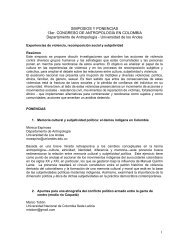Edited by Jean Comaroff and John L. Comaroff - 13 Congreso de ...
Edited by Jean Comaroff and John L. Comaroff - 13 Congreso de ...
Edited by Jean Comaroff and John L. Comaroff - 13 Congreso de ...
Create successful ePaper yourself
Turn your PDF publications into a flip-book with our unique Google optimized e-Paper software.
<strong>John</strong> L. <strong>Comaroff</strong><strong>and</strong><strong>Jean</strong> <strong>Comaroff</strong><br />
16<br />
to saturate the state itself, yielding a politics of illusion that, more than just<br />
front the appropriation of resources <strong>by</strong> ruling elites, has erected an edifice<br />
of "simulated government": government that concocts false censuses <strong>and</strong><br />
<strong>de</strong>velopment schemes, even holds fictitious elections. Bogus bureaucracy,<br />
in fact, has surfaced as a pervasive theme in analyses of postcolonial politics.<br />
Reno (1995, 2000), for example, speaks of "the shadow state" in<br />
Sierra Leone <strong>and</strong> beyond, in which a realpolitik of thuggery <strong>and</strong> profiteering<br />
is conducted behind a faca<strong>de</strong> of formal administrative respectability;<br />
similarly, Bayart, Ellis, <strong>and</strong> Hibou (1999: 20f£.) stress that, in the "felonious"<br />
state, hid<strong>de</strong>n power brokers, doppelgangers of a legitimate civil<br />
service, control political <strong>and</strong> economic life, often ostensibly un<strong>de</strong>r the<br />
sway of partisan spiritual forces. Sha<strong>de</strong>s here again of Derrida's (1994: 83)<br />
"phantom-states," in which organized crime performs for citizens the<br />
functions once provi<strong>de</strong>d <strong>by</strong> government. In these circumstances, the official<br />
edifice becomes the counterfeit, predation the reality. In<strong>de</strong>ed, as James<br />
Ferguson (2006: 15) remarks, there is "an abundance of shadows" in recent<br />
accounts of African political economy. But not only there. Saddam Hussein's<br />
"shadow state" was said to "<strong>de</strong>fy <strong>de</strong>mocracy" in Iraq;47 nocturnal<br />
"shadow players" are alleged to thrive where offshore banking meets illegal<br />
money laun<strong>de</strong>ring in Belize (Duffy 2000); "shadow" business is<br />
blamed for thwarting economic growth in Peru. 48 Conversely, the fragile<br />
peace that currently prevails in Ambon, Spyer (chapter 5 below) says, was<br />
ma<strong>de</strong> "in the shadow of the law." Ferguson (2006: 16£.) insists, correctly,<br />
that there is more at work here than old colonial archetypes: the trope conveys<br />
a contemporary sense of inscrutability. And also a doubling, the existence<br />
of parallel worlds of cl<strong>and</strong>estine government, irregular soldiers, <strong>and</strong><br />
occult economies that revives long-st<strong>and</strong>ing talk about "dark" vestiges of<br />
the mo<strong>de</strong>rnist idyll. But shadows, he reminds us, are less dim copies than<br />
likenesses, others who are also selves. After all, many have insisted that the<br />
vaunted European state is itself as much a chimera as a reality (Milib<strong>and</strong><br />
1969: 49; Abrams 1988: 76).<br />
The Shadow <strong>and</strong> the Thing Itself<br />
The resonance between shadow <strong>and</strong> counterfeit realities also captures<br />
something of the effects of neoliberal <strong>de</strong>regulation on governance, something<br />
evi<strong>de</strong>nt worldwi<strong>de</strong> but most marked in postcolonies: the unsettling<br />
counterpoint between the outsourcing of the state <strong>and</strong> the usurpation of<br />
sovereignty, not least in the realm of policing <strong>and</strong> warfare. Government, as<br />
it disperses itself, becomes less <strong>and</strong> less an ensemble of bureaucratic institutions,<br />
more <strong>and</strong> more a licensing-<strong>and</strong>-franchising authority. This, in turn,<br />
Law <strong>and</strong> Disor<strong>de</strong>r in the Postea/any: An Introduction<br />
provi<strong>de</strong>s fresh opportunities, at all levels, for capitalizing both on the<br />
assets of the state <strong>and</strong> on its imprimatur. Kickbacks have become a sine<br />
qua non of office in many places, countries with sustained cultures of corruption<br />
heading the list. In India, for one, bribes are said to be routine in<br />
securing contracts, loans, <strong>and</strong> h<strong>and</strong>outs, although, as Akhil Gupta (1995:<br />
384) notes, high-level functionaries raise large sums from relatively few<br />
clients, while their humbler counterparts collect small amounts from<br />
larger constituencies-<strong>and</strong> hence are more visibly "corrupt."49 Nothing<br />
new, this, for those familiar with politics in cities like Chicago. But in<br />
South Asia, Africa, <strong>and</strong> Latin America, these practices are often disarmingly<br />
explicit <strong>and</strong> unpoliced. To wit, police <strong>and</strong> customs personnel, especially<br />
where their pay is low or unreliable, frequently take part in mo<strong>de</strong>s<br />
of extraction in which insignias of public position are <strong>de</strong>ployed to raise<br />
rents (Blundo <strong>and</strong> Olivier <strong>de</strong> Sardan 2001; Roitman 2005: 186). Reports<br />
of cops who turn checkpoints into private tollbooths are legion; an Economist<br />
team driving in 2002 from Douala, Cameroon, to a town less than<br />
five hundred kilometers to the southeast encountered more than fortyseven<br />
roadblocks.50 Revenues are also routinely raised <strong>by</strong> impersonating<br />
the state: <strong>by</strong> putting on counterfeit uniforms, bearing phony i<strong>de</strong>ntity<br />
documents, <strong>and</strong> <strong>de</strong>ploying other fake accouterments of authorityY In like<br />
vein, as sovereignty splinters, agents of a motley array of statelike entities,<br />
from quasi-corporate religious organizations to militias, find ways of<br />
<strong>de</strong>m<strong>and</strong>ing recognition <strong>and</strong> tribute.<br />
The readiness of ordinary people to exploit the interstices between official<br />
<strong>and</strong> backstage realities, <strong>and</strong> to seize insignias of authority, may be<br />
symptomatic of the ten<strong>de</strong>ncy un<strong>de</strong>r market fundamentalism everywhere to<br />
blur the lines separating licit from illicit business. Heightened pressure to<br />
make profit, to un<strong>de</strong>rcut competition <strong>and</strong> reduce costs, has spawned ever<br />
more complex articulations of "formal" <strong>and</strong> "informal" production. As a<br />
recent account of the construction industry in Miami makes plain, convoluted<br />
chains of subcontracting now tie the most reputable firms to traffickers<br />
in illegal immigrant labor, building criminality into the very heart of the<br />
"American dream business."52 In the murky world of outsourcing, the informal<br />
sha<strong>de</strong>s into the illicit, whether it be in hiring undocumented workers,<br />
greasing palms, or moving contrab<strong>and</strong>. This reinforces our earlier observation<br />
about the dangerous liaisons between north <strong>and</strong> south, about the<br />
ways in which "respectable" metropolitan tra<strong>de</strong> gains <strong>by</strong> <strong>de</strong>flecting the<br />
risks <strong>and</strong> moral taint of outlaw commerce "beyond the bor<strong>de</strong>r." An increasing<br />
proportion of postcolonial enterprise may appear shady <strong>and</strong> brutal,<br />
but it is integral to the workings of the global scheme of things.<br />
17



